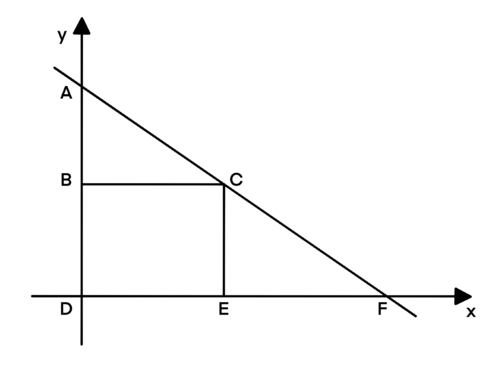Difference between revisions of "1994 AHSME Problems/Problem 28"
(Created page with "==Problem== In the <math>xy</math>-plane, how many lines whose <math>x</math>-intercept is a positive prime number and whose <math>y</math>-intercept is a positive integer pass t...") |
Isabelchen (talk | contribs) m (→Solution 2) |
||
| (7 intermediate revisions by 4 users not shown) | |||
| Line 3: | Line 3: | ||
<math> \textbf{(A)}\ 0 \qquad\textbf{(B)}\ 1 \qquad\textbf{(C)}\ 2 \qquad\textbf{(D)}\ 3 \qquad\textbf{(E)}\ 4</math> | <math> \textbf{(A)}\ 0 \qquad\textbf{(B)}\ 1 \qquad\textbf{(C)}\ 2 \qquad\textbf{(D)}\ 3 \qquad\textbf{(E)}\ 4</math> | ||
| − | ==Solution== | + | |
| + | ==Solution 1== | ||
| + | |||
| + | The line with <math>x</math>-intercept <math>a</math> and <math>y</math>-intercept <math>b</math> is given by the equation <math>\frac{x}{a} + \frac{y}{b} = 1</math>. We are told <math>(4,3)</math> is on the line so | ||
| + | |||
| + | <cmath>\frac{4}{a} + \frac{3}{b} = 1 \implies ab - 4b - 3a = 0 \implies (a-4)(b-3)=12</cmath> | ||
| + | |||
| + | Since <math>a</math> and <math>b</math> are integers, this equation holds only if <math>(a-4)</math> is a factor of <math>12</math>. The factors are <math>1, 2, 3, 4, 6, 12</math> which means <math>a</math> must be one of <math>5, 6, 7, 8, 10, 16</math>. The only members of this list which are prime are <math>a=5</math> and <math>a=7</math>, so the number of solutions is <math>\boxed{\textbf{(C) } 2}</math>. | ||
| + | |||
| + | ==Solution 2== | ||
| + | |||
| + | [[File:1984AHSMEP28.png|500px|center]] | ||
| + | |||
| + | Let <math>C = (4,3)</math>, <math>DF=a</math>, and <math>AD=b</math>. As stated in the problem, the <math>x</math>-intercept <math>DF=a</math> is a positive prime number, and the <math>y</math>-intercept <math>AD=b</math> is a positive integer. | ||
| + | |||
| + | Through similar triangles, <math>\frac{AB}{BC}=\frac{CE}{EF}</math>, <math>\frac{b-3}{4}=\frac{3}{a-4}</math>, <math>(a-4)(b-3)=12</math> | ||
| + | |||
| + | The only cases where <math>a</math> is prime are: | ||
| + | <cmath>\begin{cases} | ||
| + | a-4=1 & a=5 \\ | ||
| + | b-3=12 & b=15 | ||
| + | \end{cases}</cmath> | ||
| + | |||
| + | <cmath>and</cmath> | ||
| + | |||
| + | <cmath>\begin{cases} | ||
| + | a-4=3 & a=7 \\ | ||
| + | b-3=4 & b=5 | ||
| + | \end{cases}</cmath> | ||
| + | |||
| + | So the number of solutions are <math>\boxed{\textbf{(C) }2}</math>. | ||
| + | |||
| + | ~[https://artofproblemsolving.com/wiki/index.php/User:Isabelchen isabelchen] | ||
| + | |||
| + | ==See Also== | ||
| + | |||
| + | {{AHSME box|year=1994|num-b=27|num-a=29}} | ||
| + | {{MAA Notice}} | ||
Latest revision as of 06:58, 28 September 2023
Contents
Problem
In the ![]() -plane, how many lines whose
-plane, how many lines whose ![]() -intercept is a positive prime number and whose
-intercept is a positive prime number and whose ![]() -intercept is a positive integer pass through the point
-intercept is a positive integer pass through the point ![]() ?
?
![]()
Solution 1
The line with ![]() -intercept
-intercept ![]() and
and ![]() -intercept
-intercept ![]() is given by the equation
is given by the equation ![]() . We are told
. We are told ![]() is on the line so
is on the line so
![]()
Since ![]() and
and ![]() are integers, this equation holds only if
are integers, this equation holds only if ![]() is a factor of
is a factor of ![]() . The factors are
. The factors are ![]() which means
which means ![]() must be one of
must be one of ![]() . The only members of this list which are prime are
. The only members of this list which are prime are ![]() and
and ![]() , so the number of solutions is
, so the number of solutions is ![]() .
.
Solution 2
Let ![]() ,
, ![]() , and
, and ![]() . As stated in the problem, the
. As stated in the problem, the ![]() -intercept
-intercept ![]() is a positive prime number, and the
is a positive prime number, and the ![]() -intercept
-intercept ![]() is a positive integer.
is a positive integer.
Through similar triangles, ![]() ,
, ![]() ,
, ![]()
The only cases where ![]() is prime are:
is prime are:
![\[\begin{cases} a-4=1 & a=5 \\ b-3=12 & b=15 \end{cases}\]](http://latex.artofproblemsolving.com/0/c/a/0cac85b866ec5f0657b04e3c17ce9e8c4bb36fe3.png)
![]()
![\[\begin{cases} a-4=3 & a=7 \\ b-3=4 & b=5 \end{cases}\]](http://latex.artofproblemsolving.com/3/0/8/3089bf447d47f45d44563da32f68bbcadb7749b4.png)
So the number of solutions are ![]() .
.
See Also
| 1994 AHSME (Problems • Answer Key • Resources) | ||
| Preceded by Problem 27 |
Followed by Problem 29 | |
| 1 • 2 • 3 • 4 • 5 • 6 • 7 • 8 • 9 • 10 • 11 • 12 • 13 • 14 • 15 • 16 • 17 • 18 • 19 • 20 • 21 • 22 • 23 • 24 • 25 • 26 • 27 • 28 • 29 • 30 | ||
| All AHSME Problems and Solutions | ||
The problems on this page are copyrighted by the Mathematical Association of America's American Mathematics Competitions. 










